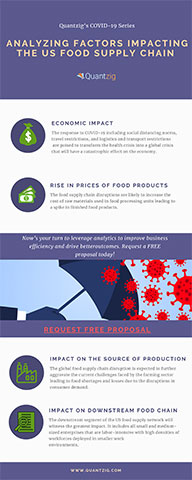LONDON--(BUSINESS WIRE)--Quantzig, a premier analytics solutions provider announces the completion of its recent article that offers comprehensive insights into the impact of Covid-19 on the US food supply chain.
The impact of COVID-19 on global supply chains has been widespread across industries with electronics, capital goods, commodities, and retail firms all facing headwinds from reduced availability of raw materials. Talk to our analytics experts to learn how we can help you devise suitable action plans to ensure business continuity amid the crisis.
Over the past few weeks, US retailers and food industry players have been battling to ensure that the food supply chains remain robust in the light of unprecedented demand in recent weeks. The impact of the pandemic in the United States was so severe that it forced governments to impose rigorous lockdowns and travel bans in an effort to flatten the curve. While the coronavirus impact has been felt by all aspects of the economy, the food supply chain is no exception. Experts suggest that the food supply chain is one of the hardest-hit segments in the US and has resulted in acute shortages of certain product categories owing to the wide-spread impact of supply chain disruptions.
How should businesses respond to minimize food supply chain disruptions and the fallout from lockdowns and other restrictions, you ask? Request a FREE proposal for insights from our analytics experts.
According to Quantzig’s supply chain analytics experts, “Governments and businesses will have to collaborate and develop effective policies to respond to these varied impacts to avoid supply chain disruptions, higher food prices, and severe economic fallout for millions of employees.”
How has COVID-19 disrupted the US food supply chain?
Based on our interaction with market leaders and decision-makers in the US food industry, we’ve come up with 5 hypotheses that illustrate the impact of COVID-19 on the food supply chain in the US.
#1 Economic Impact
The response to COVID-19 including social distancing, travel restrictions, work from home policy enforcement, and logistics and transport restrictions, all are poised to transform the health crisis into a global crisis that will have a catastrophic effect on the economy.
#2 Direct Impact on the Source of Food Production
The global food supply chain disruption is expected to further aggravate the current challenges faced by the farming sector leading to food shortages and losses due to the disruptions in consumer demand.
#3 Rise in Prices of Food Products
The food supply chain disruptions are likely to increase the cost of raw materials used in food processing units leading to a spike in finished food products.
#4 Food Retailers Will Remain Unaffected
Since grocery retail chains and food service firms have greater control over the safety and hygiene of the food supply chain, they are far less vulnerable to mandatory business closures.
#5 Downstream Food Supply Chain Will Face an Irreversible Impact
The downstream segment of the US food supply network will witness the greatest impact. It includes all small and medium-sized enterprises that are labor-intensive with high densities of workforces deployed in smaller work environments.
We now offer solutions to help businesses ensure continuity in the post-COVID period. Book a FREE solution demo to learn how our solutions have helped leading businesses to tackle similar food supply chain disruptions in the past.
About Quantzig
Quantzig is a global analytics and advisory firm with offices in the US, UK, Canada, China, and India. For more than 15 years, we have assisted our clients across the globe with end-to-end data modeling capabilities to leverage analytics for prudent decision making. Today, our firm consists of 120+ clients, including 45 Fortune 500 companies. For more information on our engagement policies and pricing plans, visit: https://www.quantzig.com/request-for-proposal




